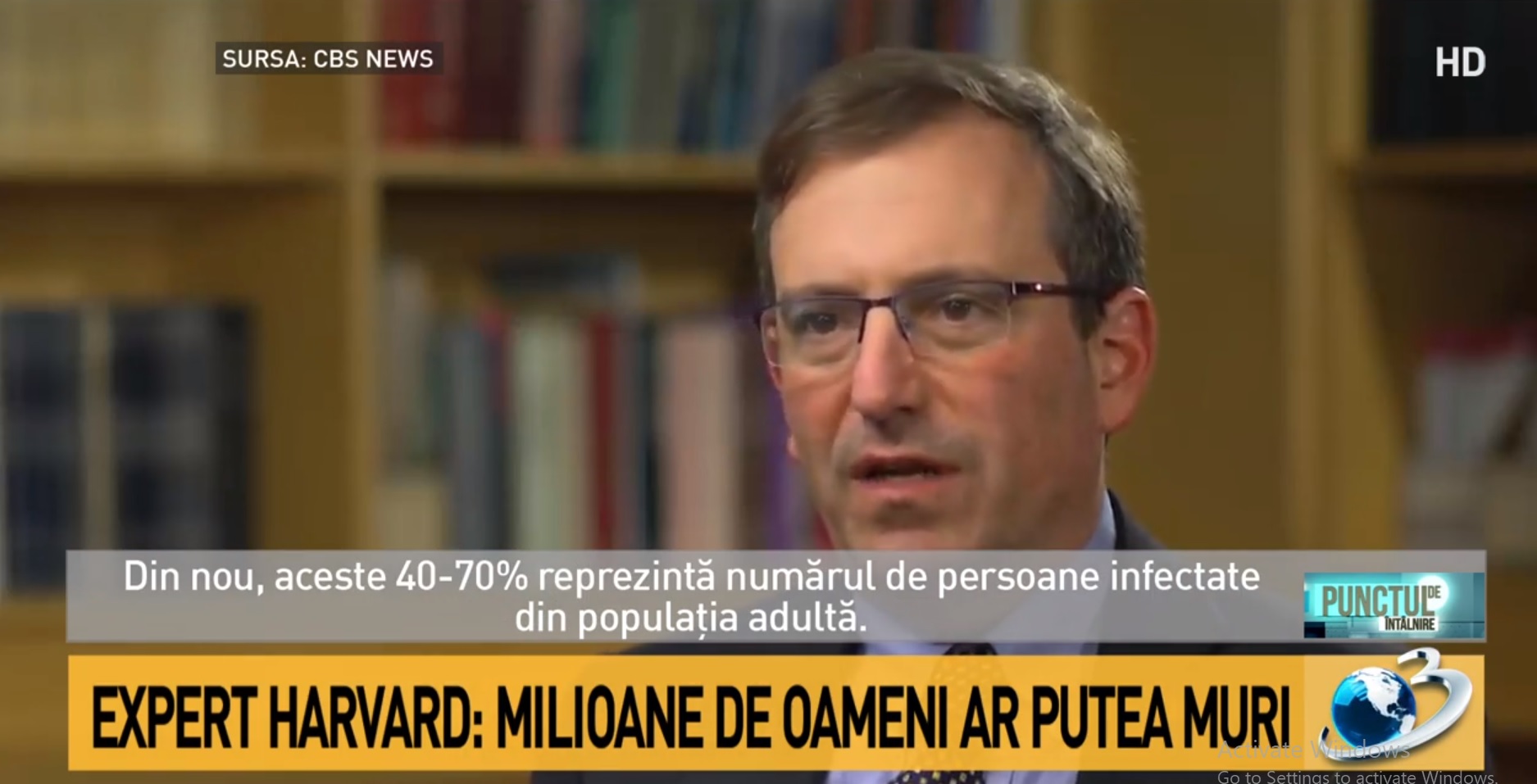Jim Axelrod de la CBS News a stat de vorbă cu unul dintre cei mai buni experti mondiali in epidemiologie, Marc Lipsitch de la Harvard University, despre virusurile care sunt ameninţătoare, in special despre coronavirus.
Q: Numărul care îi sperie pe foarte mulţi oameni este această estimare care arată că între 40 şi 70% din populaţia adultă a lumii ar putea fi infectată cu coronavirus.
A: ”Din nou, aceste 40-70% reprezintă numărul de persoane infectate din populaţia adultă. Ştim că jumătate dintre cei care sunt infectaţi nu au deloc sau aproape deloc simptome.
Nu ştim cât de mulţi sunt în această stare. Dacă ar fi jumătate dintre oameni, atunci 1% sau 2% dintre cei cu simptome se reduc la jumătate. Oricare ar fi cifrele, o să fie o situaţie urâtă dacă se va răspândi la nivelul previziunilor. Şi eu cred că asta se poate întâmpla.
Şi o să fie milioane de oameni care mor şi nu cred că putem evita.
Cred că există motive ca oamenii să fie îngrijoraţi şi cred că putem transforma aceste îngrijorări în acţiuni concrete care să îmbunătăţească situaţia. Cei 1% dintre cei cu simptome, acea rată de morbiditate. Nici aici nu avem o ecuaţie matematică foarte clară”, a zis el.
Q : Oamenii peste 65 de ani sunt mai predispuşi la îmbolnăvire sau poate că oamenii sub 30 de ani sunt mai puţin expuşi. Corect ?
A: ”Predispoziţia la infecţia simptomatică pare a creşte în special odată cu vârsta şi incidenţa este foarte mare la persoanele foarte în vârstă.
La cei care au simptome, creşte şi riscul de deces.
Deci acest risc este concentrat în cadrul grupelor persoanelor de vârstă înaintată. Acolo sunt riscurile cele mai mari”, a mai spus acesta.
Urmariti interviul CBS News difuzat de Antena 3 la Punctul de intalnire :
Iata biografia expertului :
Marc Lipsitch

Marc Lipsitch is Professor of Epidemiology and Director of the Center for Communicable Disease Dynamics at the Harvard T.H. Chan School of Public Health. He is an author of more than 250 peer-reviewed publications on antimicrobial resistance, epidemiologic methods, mathematical modeling of infectious disease transmission, pathogen population genomics, and immunoepidemiology of Streptococcus pneumoniae. Recently he has had a growing interest in the use of transmission-dynamic simulations to improve the design of randomized and observational studies of infectious disease interventions. He has also begun to contribute to topics in bioethics related to infectious diseases and clinical trials in emergencies.
He was a co-founder of the Cambridge Working Group in 2014, whose efforts helped to initiate a pause in US government funding for research involving the creation of potential pandemic pathogens, such as transmission-enhanced avian influenza strains. He has written extensively on aspects of science policy in relation to such studies.
Dr. Lipsitch has received awards for research articles, mentoring and journal reviewing. In 2014 he received the Robert Austrian Award for contributions to pneumococcal research, and in 2015 was elected a Fellow of the American Academy of Microbiology. He is or was on the editorial advisory boards/associate editor of eLife, PLoS Medicine, Journal of Infectious Diseases, American Journal of Epidemiology, Epidemiology, and Epidemics. He has served on the President’s Council of Advisors on Science and Technology Working Group on H1N1 Influenza, as well as CDC’s Team B for the 2009 H1N1 pandemic and several advisory groups during the 2014-5 Ebola outbreak in West Africa. He has provided advice to the Food and Drug Administration, World Health Organization, Centers for Disease Control, Congressional Budget Office, Defense Science Board, several pharmaceutical companies and the governments of Canada and Mexico.
Dr. Lipsitch joined the faculty of the Harvard School of Public Health in 1999, after a postdoctoral fellowship at Emory University with Dr. Bruce Levin, a visiting scientist appointment at CDC, and a D.Phil. in Zoology from the University of Oxford, where he studied with Drs. Robert May and Martin Nowak.





